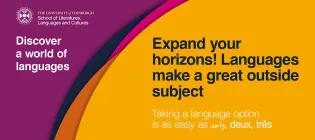Skills and experience
Studying one or more languages to degree level demonstrates that you are a good communicator, and someone open to other cultures and new ideas - what employers value as intercultural competence.
Beyond the language skills you'll develop on our programmes, you will gain a nuanced understanding of diverse cultures and societies.
Graduating with a four-year Master of Arts degree from the University of Edinburgh also shows intellectual maturity, resilience, and flexibility.
The skills you will be able to demonstrate to employers include the ability to:
- understand, analyse and articulate complex issues and concepts
- manage your time to meet deadlines on different types of projects
- work independently and as part of a group
Opportunities across sectors
Our programmes are an excellent primer for a range of careers, especially those that place a premium on thinking that is both disciplined and imaginative.
Within the private, public, not-for-profit, and for-benefit sectors, previous graduates have gone on to work in:
- business, finance, commerce and tech
- communications, marketing, advertising and public relations
- education, outreach, advocacy and training
- journalism, broadcasting and media
- leisure, tourism and travel
- politics, policy work, diplomacy, civil service and law
- publishing, culture, heritage and the arts
- research, development, consultancy and venture acceleration
- translating and interpreting
Local and global opportunities
With increasing migration in response to changing global dynamics, there is demand for our graduates in Scotland, the UK and abroad.
Wherever you are based in the world, the ability to communicate in another major language, and to understand the cultures to which it opens doors, will make you stand out.
If you are keen to work abroad, it’s good to know that around 150 million people in the world speak Russian, which is widely used in global cultural and political contexts. It is the official language of four countries and is commonly understood throughout Eastern Europe and Central Asia.
There are also large communities of Russian speakers in China, the United States, France, Germany, Spain, Norway, Israel and the UK.
Further study
The enhanced research skills you will develop on a four-year programme, particularly in your honours years, are a valuable asset if you wish to continue studying at postgraduate level.
At the University of Edinburgh, we typically offer a Masters by Research degree in Russian Studies and interdisciplinary taught masters programmes in:
- Comparative Literature
- Intermediality
Any of our masters degrees, whether research-based or taught, is a good foundation for a PhD, but is equally of value as a stand-alone qualification.



